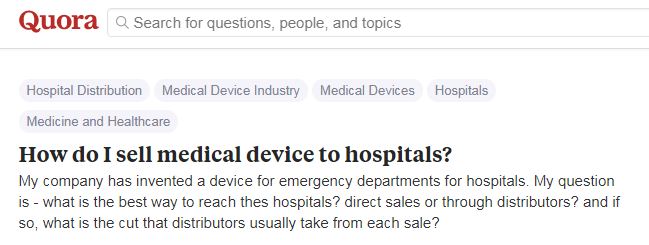This question gets asked a lot of times on Quora and tends to generate some interestingly varied responses, given the broad scope the topic covers. In this post, we’ll discuss our take on this question by focusing on a specific aspect of selling medical devices: deciding between doing direct selling vs. partnering with distributors.

Choosing the right sales channel is a critical decision to make since it’s going to influence whether or not your product reaches the customers you’re aiming for. That’s why arriving at this decision involves weighing a lot of factors. There’s more to it than just opting for the cheaper option, and that’s what today’s entry is going to talk about.
Related: Industry Insights: Fixing What’s Wrong With B2B Healthcare Marketing
Laying the Groundwork
But first, it’s important to note some of the things you need to take into account prior to bringing your medical device to market. If you’re planning to sell to hospitals and healthcare institutions in the United States, make sure that you’ve cleared all regulatory hurdles, such as the FDA’s medical device registration and listing process as well as complied with any applicable state-level requirements.
Next, it’s essential that you become deeply familiar with how device purchases are made in your target hospitals and, more importantly, identify the persons who make buying decisions at these institutions. Most hospitals have a committee that evaluates, selects, and purchases medical devices for the organization. Having a clear idea of the people and process involved before you actually start to market or sell your product will help you choose the right sales channel.
Related: Healthcare Consulting Firm Poised to Expand in High-Growth Market
#1. Partnering with a Distributor
Distributors, resellers, and channel partners can help your product cross that “last mile” to reach your target customers. Distributors typically have the knowledge and connections needed to access buyers in a specific region, which would otherwise be out of reach to companies that don’t have the resources for establishing and maintaining a presence in that area.
Since a third-party channel partner already does business with the hospitals in an area you’re trying to sell to, working with one lets you expand into a new market at lower cost than entering directly.
However, your company may need to share between 10% to 50% of revenues with distributors as commissions and partner discounts.
Accordingly, partnering with a distributor is a good option if:
- The added revenue brought in by the channel partner exceeds the costs of establishing and nurturing that relationship.
- The partner can deliver the value you’re looking for, such as their customer base, reputation, and market reach.
- The channel partner lets you directly deal with end users, such as for providing support and maintenance services on your device.
Related: The Advantages of Medical Tourism: Why Aren’t You Hopping on a Plane Yet?
#2.Taking the Direct Sales Route
Directly selling to hospitals means forming and managing your own sales team that does meetings with prospects and closes deals with your target buyers.
The typical medical device purchase process needs your sales reps to be physically present at different points in the buying cycle so that targeting multiple hospitals at different locations can require sales teams to stay close by or be available on short notice.
While direct selling brings several key advantages such as having full control over the sales and revenue process as well as direct interaction with your customers, selling your device directly to hospitals carries additional costs and overhead related to managing sales teams along with a potentially more difficult entry into a new market.
As such, direct sales is an ideal route to take if:
- Your product doesn’t need much in the way of customization and setup for each customer.
- The costs of managing your own sales team is significantly less than the amount of revenue you need to share with potential channel partners.
- Your business has the resources to create and handle multiple sales teams, most likely in different locations.
Related: Top Healthcare Marketing Trends to Expect
The Takeaway
Whether you choose direct sales or distributors depends not only on which one you can readily afford, but also on your target market’s characteristics and your company’s current capabilities.
In some cases, it might make more sense for you to combine these two sales channels, such as partnering with a distributor in certain regions while directly selling to hospitals in other locations. At the same time, you may find it more cost-effective to work with a channel partner as a medical device startup but, once your company has matured enough, penetrating new markets with your own sales team may be a more attractive option.













